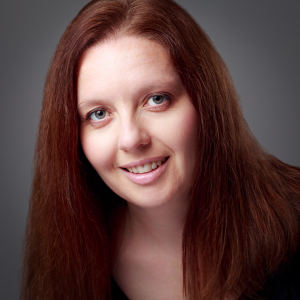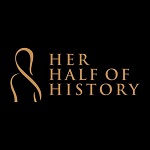Talking About Women’s History: Three Questions and an Answer with Lori Davis
Lori Davis is the writer and producer of the podcast and blog Her Half of History. The show explores what it was like to be a woman in the past, from queens to slaves to everything in between, with episodes on women who successfully seized control of an empire, the nitty gritty of how to do laundry without electricity or plumbing, when women finally could get credit cards and more. In short, lots of fascinating stuff that doesn’t show up in mainstream history classes.
Her Half of History is a member of both Evergreen Podcasts and the Into History podcast network.
Take it away, Lori!
How do you choose the topics for your episodes?
My listeners choose! At least, they choose the theme for each overall series.
My setup is different than most history podcasters because I’m not trying to cover a chronological period, and I’m also not picking topics at random. Instead, I let listeners vote on a series theme. Past themes have included women who seized power, women as great painters, and women who escaped slavery. I’ve also done some social history themes: the history of housework, the history of girlhood, the history of getting married, etc.
Once the polls are closed and the theme is chosen, I dive into research mode. I choose the topics for each individual episode based on what I find. For example, I am currently working on Series 12: The Last Queen. I’ll have episodes on Boudica, Cleopatra, Liliʻuokalani, and Marie Antoinette for sure. There are also a whole host of less famous women that will also get an episode.
I always try to include a variety of locations and historical eras because one of my favorite things about history is the cross-cultural comparison. I love looking at how people faced very similar situations and sometimes came up with radically different solutions. Or sometimes they came up with the same innovative solution as another group with whom they had absolutely no contact. Unfortunately, I find that the sources available to me often skew heavily in favor of Western Europe and North America, but I do try hard to make sure that my podcast does include women from other places.
When did you first become interested in women’s history? What sparked that interest?
I’ve always loved history in general, but I used to despise women’s history! When I was in college, I took a History of Civilization course. The professor had clearly been informed that women exist because at the end of each unit, he’d say, “What was the position of women in this civilization?” The answer was always “Bad.” We’d list all the rights women didn’t have (it was always the same list as for the previous civilization), and then we’d move on to the next unit. I thought women’s history was the most boring thing ever. I mean why even ask the question if that’s all there is to say? I thought we should have just stuck with the interesting stuff, which was what the men were doing.
I’d also heard a lot of women rant about how much discrimination women faced in the past (and the present). That wasn’t exactly boring, but it was depressing. A lot of what they said was true, but it didn’t make me want to hear more.
Women’s history sort of snuck up on me. When choosing a research topic for my capstone thesis, I wanted to do something with literacy in territorial New Mexico. That was too big for the time available, so cutting it down to women’s literacy seemed like a way to make it manageable. Many years later when I wanted to make a history podcast, I was casting around for what my distinguishing niche would be, and it occurred to me that most of the history podcasts I had binged and loved didn’t include a lot of women. It seemed like a place where I could add to the conversation. One thing really just led to another, and I just published my 117th episode. I really love women’s history now!
What was the most surprising thing you’ve found doing historical research for your work?
Just how much there is on women! Earlier I had the vague impression that traditional history didn’t include many women because women weren’t allowed to do anything. That meant women’s history had to be short, vague, boring, depressing, or all of the above. Nothing could be farther from the truth.
It is true that men have dominated the historical record, but when you take the trouble to look, you find women everywhere. Given the reality of discrimination against women, it is incredible just how much they did manage to accomplish, in pretty much every field of human endeavor. There is absolutely no shortage of things to say about women, their lives, and their achievements.
A question from Lori: Who are your favorite women in history that you think should be better known than they are?
At least for today, I would say Margaret Chase Smith (1897-1995), senator from Maine. She is certainly not forgotten, but is not as well known as she should be, and is one of my personal heroes.
Tomorrow I might have a different answer. So many amazing women. So hard to chose.
* * *
Want to know more about Lori Davis and her work?
Visit her website: https://herhalfofhistory.com/
Follow her on the social media platform previously know as Twitter: : https://twitter.com/her_half
Visit her on Facebook: https://www.facebook.com/herhalfofhistory
Check out her Instagram account: https://www.instagram.com/herhalfofhistory/
Come back tomorrow for a whole bunch of questions and an answer about women in ancient Rome with historian Emma Southon,






